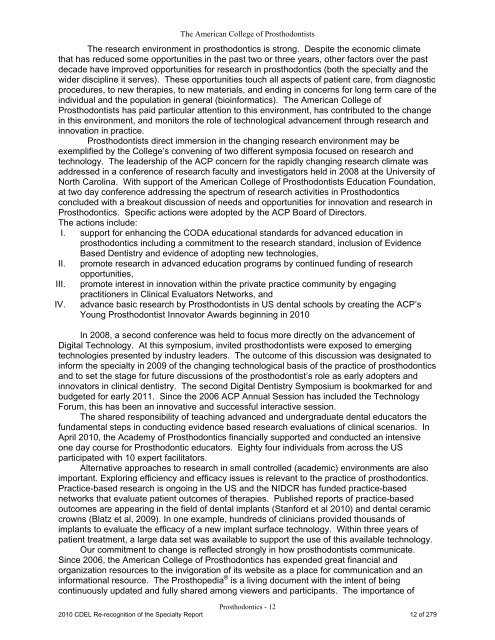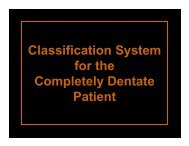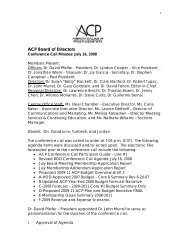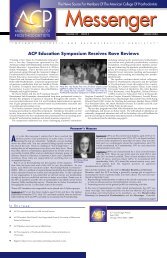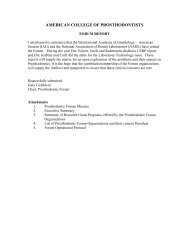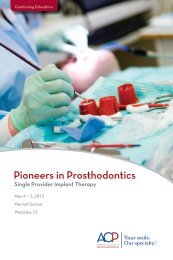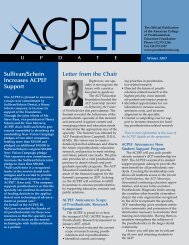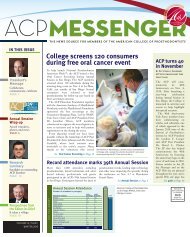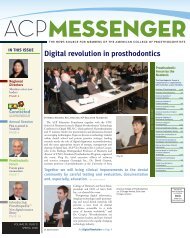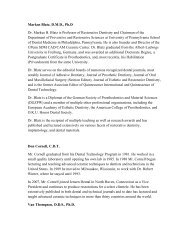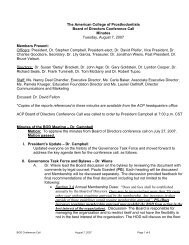PROSTHODONTICS - American College of Prosthodontists
PROSTHODONTICS - American College of Prosthodontists
PROSTHODONTICS - American College of Prosthodontists
You also want an ePaper? Increase the reach of your titles
YUMPU automatically turns print PDFs into web optimized ePapers that Google loves.
The <strong>American</strong> <strong>College</strong> <strong>of</strong> <strong>Prosthodontists</strong>The research environment in prosthodontics is strong. Despite the economic climatethat has reduced some opportunities in the past two or three years, other factors over the pastdecade have improved opportunities for research in prosthodontics (both the specialty and thewider discipline it serves). These opportunities touch all aspects <strong>of</strong> patient care, from diagnosticprocedures, to new therapies, to new materials, and ending in concerns for long term care <strong>of</strong> theindividual and the population in general (bioinformatics). The <strong>American</strong> <strong>College</strong> <strong>of</strong><strong>Prosthodontists</strong> has paid particular attention to this environment, has contributed to the changein this environment, and monitors the role <strong>of</strong> technological advancement through research andinnovation in practice.<strong>Prosthodontists</strong> direct immersion in the changing research environment may beexemplified by the <strong>College</strong>’s convening <strong>of</strong> two different symposia focused on research andtechnology. The leadership <strong>of</strong> the ACP concern for the rapidly changing research climate wasaddressed in a conference <strong>of</strong> research faculty and investigators held in 2008 at the University <strong>of</strong>North Carolina. With support <strong>of</strong> the <strong>American</strong> <strong>College</strong> <strong>of</strong> <strong>Prosthodontists</strong> Education Foundation,at two day conference addressing the spectrum <strong>of</strong> research activities in Prosthodonticsconcluded with a breakout discussion <strong>of</strong> needs and opportunities for innovation and research inProsthodontics. Specific actions were adopted by the ACP Board <strong>of</strong> Directors.The actions include:I. support for enhancing the CODA educational standards for advanced education inprosthodontics including a commitment to the research standard, inclusion <strong>of</strong> EvidenceBased Dentistry and evidence <strong>of</strong> adopting new technologies,II. promote research in advanced education programs by continued funding <strong>of</strong> researchopportunities,III. promote interest in innovation within the private practice community by engagingpractitioners in Clinical Evaluators Networks, andIV. advance basic research by <strong>Prosthodontists</strong> in US dental schools by creating the ACP’sYoung Prosthodontist Innovator Awards beginning in 2010In 2008, a second conference was held to focus more directly on the advancement <strong>of</strong>Digital Technology. At this symposium, invited prosthodontists were exposed to emergingtechnologies presented by industry leaders. The outcome <strong>of</strong> this discussion was designated toinform the specialty in 2009 <strong>of</strong> the changing technological basis <strong>of</strong> the practice <strong>of</strong> prosthodonticsand to set the stage for future discussions <strong>of</strong> the prosthodontist’s role as early adopters andinnovators in clinical dentistry. The second Digital Dentistry Symposium is bookmarked for andbudgeted for early 2011. Since the 2006 ACP Annual Session has included the TechnologyForum, this has been an innovative and successful interactive session.The shared responsibility <strong>of</strong> teaching advanced and undergraduate dental educators thefundamental steps in conducting evidence based research evaluations <strong>of</strong> clinical scenarios. InApril 2010, the Academy <strong>of</strong> Prosthodontics financially supported and conducted an intensiveone day course for Prosthodontic educators. Eighty four individuals from across the USparticipated with 10 expert facilitators.Alternative approaches to research in small controlled (academic) environments are alsoimportant. Exploring efficiency and efficacy issues is relevant to the practice <strong>of</strong> prosthodontics.Practice-based research is ongoing in the US and the NIDCR has funded practice-basednetworks that evaluate patient outcomes <strong>of</strong> therapies. Published reports <strong>of</strong> practice-basedoutcomes are appearing in the field <strong>of</strong> dental implants (Stanford et al 2010) and dental ceramiccrowns (Blatz et al, 2009). In one example, hundreds <strong>of</strong> clinicians provided thousands <strong>of</strong>implants to evaluate the efficacy <strong>of</strong> a new implant surface technology. Within three years <strong>of</strong>patient treatment, a large data set was available to support the use <strong>of</strong> this available technology.Our commitment to change is reflected strongly in how prosthodontists communicate.Since 2006, the <strong>American</strong> <strong>College</strong> <strong>of</strong> Prosthodontics has expended great financial andorganization resources to the invigoration <strong>of</strong> its website as a place for communication and aninformational resource. The Prosthopedia ® is a living document with the intent <strong>of</strong> beingcontinuously updated and fully shared among viewers and participants. The importance <strong>of</strong>Prosthodontics - 122010 CDEL Re-recognition <strong>of</strong> the Specialty Report 12 <strong>of</strong> 279


